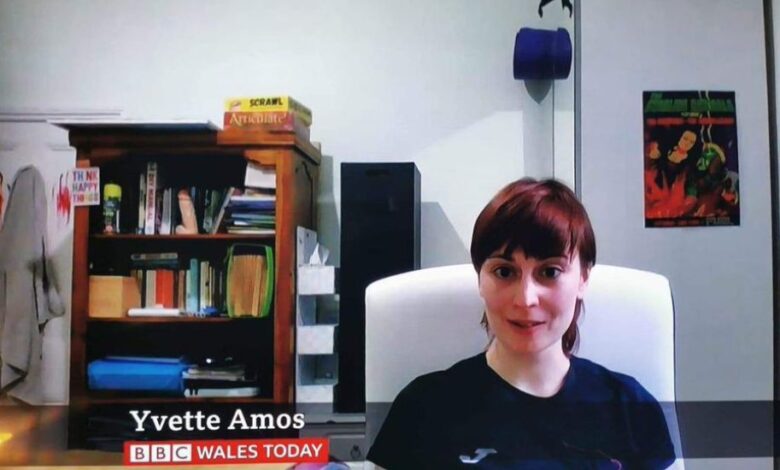Yvette Amos Today: From BBC Clip to Viral Fame

When a single moment on live television captures the collective attention of the internet, it can transform an ordinary person into an overnight sensation. Such was the case with Yvette Amos, a woman who unintentionally went viral after an appearance on BBC Wales. What began as a routine interview about unemployment during the COVID-19 pandemic soon became a memorable viral incident — spawning countless memes, commentaries, and online debates.
This article explores everything about Yvette Amos, her background, the viral interview, the global reaction, and what has happened since. We will also cover the most searched questions surrounding her, including “Yvette Amos response,” “Yvette Amos statement,” “What happened to Yvette Amos,” “Yvette Amos Wikipedia,” “Yvette Amos today,” “Yvette Amos YouTube,” and “Yvette Amos BBC Wales.”
Who Is Yvette Amos?
Before her unexpected fame, Yvette Amos was a private individual living in Wales, United Kingdom. Little is publicly documented about her early life, family, or career background — a fact that makes her viral story even more fascinating. Based on the details available from her LinkedIn profile and BBC Wales appearance, Yvette Amos was an ordinary citizen dealing with the challenges of job hunting during the pandemic, a situation relatable to thousands across the UK in 2021.
Her name gained global attention after appearing in an interview segment for BBC Wales Today, where she was invited to share her experience with unemployment. What made the clip unforgettable, however, had nothing to do with her message — but rather, what viewers noticed in the background.
The BBC Wales Incident: How It Started
On January 26, 2021, BBC Wales Today aired a segment focusing on the economic effects of COVID-19 and rising unemployment in the region. Yvette Amos joined remotely from her home via video call, just like millions of people had learned to do during lockdowns.
However, viewers quickly spotted something unusual behind her — on a bookshelf, amid ordinary items like books and board games, sat a conspicuously shaped pink object. Many immediately identified it as a phallic-shaped adult toy. Screenshots of the broadcast spread across Twitter, Reddit, and Facebook within minutes.
Journalist Grant Tucker humorously tweeted:
“Perhaps the greatest guest background on the BBC Wales news tonight. Always check your shelves before going on air.”
The post went viral, generating thousands of likes and retweets. Within hours, “Yvette Amos” had become a trending search term across the UK and beyond.
Social Media Reaction: The Meme Explosion
Social media platforms erupted with laughter, disbelief, and curiosity. Memes appeared almost immediately, often placing Yvette’s now-iconic bookshelf into new contexts — from newsrooms to movie scenes. The moment became emblematic of the awkwardness of pandemic-era video calls, joining a long list of online mishaps where people forgot to check their camera angles or surroundings before going live.
While some found it hilarious, others sympathized with Yvette, noting how easy it is to overlook such things in a home environment. Many commenters argued that she had done nothing wrong — her interview had been professional, articulate, and heartfelt — and that focusing on a background detail was unfair. Still, the humor proved irresistible for much of the internet.
Yvette Amos Response and Statement: What Did She Say?
One of the biggest mysteries surrounding the viral story is Yvette Amos’s own reaction. Despite the avalanche of memes and mentions, no official public statement or media interview was released by her following the event. Unlike many viral figures who later embrace their internet fame, Yvette Amos chose to remain silent.
According to the public record, she never issued a statement through BBC Wales or any other outlet. Her social-media presence has remained minimal, and there is no verified Twitter, Instagram, or Facebook profile under her name connected to the incident.
This lack of comment led to further speculation — was it embarrassment, privacy concerns, or simply the wish to let the moment fade away? Most observers believe that Yvette Amos preferred to step back from the spotlight rather than fuel the story further.
What Happened to Yvette Amos?
After the viral explosion of early 2021, mentions of Yvette Amos gradually declined in mainstream media. Searches for “What happened to Yvette Amos” remain common even years later, but credible updates are scarce.
No reports indicate that she faced any professional consequences due to the viral video, nor is there evidence of her leveraging the incident for publicity. Unlike some viral figures who pivot into influencer roles or comedy appearances, Yvette Amos seems to have resumed a private life.
On platforms like YouTube, clips of her BBC Wales interview and humorous compilations continue to circulate, often under titles such as “BBC Guest Forgets to Hide Something” or “Yvette Amos BBC Wales Clip.” These videos have collectively accumulated millions of views across different channels, ensuring that her brief moment of fame continues to live on in internet culture.
Yvette Amos BBC Wales: The Broader Context
It’s important to remember that Yvette Amos’s interview was initially intended to highlight real economic struggles during the pandemic. BBC Wales Today, a flagship regional news program, had been conducting several remote interviews to spotlight how individuals were coping with unemployment, retraining, and mental-health challenges during lockdown.
Yvette Amos’s segment was meant to illustrate these themes through her own story. In the few seconds she spoke, she presented herself sincerely, discussing the barriers she faced finding work. Unfortunately, the viral image overshadowed her words — a stark reminder of how quickly visual humor can eclipse serious discussions online.
BBC officials never commented directly on the incident, maintaining professionalism and refraining from acknowledging the viral conversation. Internally, no reports suggest that the broadcaster censored or removed the interview, though it was soon clipped and reposted by users worldwide.
Cultural Impact: Why the Story Resonated
The Yvette Amos story became emblematic of a broader social moment — the collective shift to remote communication. During lockdown, millions of professionals were forced to adapt to working and appearing on camera from their homes. It became a running joke that behind every neat camera frame could lie chaos: messy rooms, pets, children, or — in this case — an accidentally displayed adult item.
Her viral fame highlighted several truths about modern internet culture:
-
The speed of viral attention: Within minutes, a private citizen can become a trending topic.
-
The blending of public and private spaces: Remote work blurred boundaries between home life and professional settings.
-
Humor as a coping mechanism: Amid a stressful global pandemic, people found laughter in small, absurd moments like Yvette’s.
Her case joined the pantheon of pandemic-era viral incidents — from the lawyer who appeared on Zoom as a cat to reporters interrupted by their children on live TV.
Yvette Amos Wikipedia and Online Presence
As of 2025, Yvette Amos does not have an official Wikipedia page, despite continued public curiosity. The lack of a verified biography underscores her choice to remain private. Searches for her name lead mostly to news articles, Reddit discussions, and short video clips rather than long-form interviews or self-published content.
However, there are archived versions of early news coverage from 2021 that document her appearance. Sites such as The Independent, NDTV, and Metro UK all covered the story at the time, ensuring her name remains indexed in search results.
On YouTube, her segment continues to attract viewers, often included in compilations of “funniest live-TV moments” or “Zoom fails.” Most clips are under one minute long, but the fascination endures.
Why Yvette Amos Chose Silence
Yvette Amos’s refusal to comment publicly is itself an interesting choice in today’s world of viral content. Many viral individuals — from “Chewbacca Mom” to the “BBC Dad” who was interrupted by his children — have leaned into their unexpected fame, giving interviews and building online followings.
Yvette took the opposite path. Her decision to stay silent could stem from:
-
A wish to avoid public ridicule or invasion of privacy.
-
An understanding that the viral cycle is short-lived and best ignored.
-
A genuine desire to return to normal life.
Whatever her motivation, it worked: while the meme remains alive, Yvette Amos herself has faded gracefully back into anonymity.
Media Ethics and the Internet’s Double-Edged Sword
The Yvette Amos episode also raises questions about how the media and the internet treat ordinary people caught in viral moments. She was not a celebrity, influencer, or public figure — just someone who happened to appear on live television.
The fact that screenshots of her home were shared globally, sometimes mockingly, highlights how easy it is for private individuals to lose control of their image. It also illustrates how humor can sometimes overshadow empathy. While most viewers laughed harmlessly, others recognized the imbalance — a person sharing her struggles became a punchline.
This case has since been used in media-studies discussions about digital privacy and the ethics of online sharing. Universities and journalism schools have cited Yvette Amos’s experience when teaching about viral media and the importance of context.
Yvette Amos Today: Life After Viral Fame
As of 2025, there are no confirmed public updates on Yvette Amos’s current life. There is speculation that she continues to live in the UK and may have resumed normal professional activities outside the media spotlight. Her LinkedIn page, though mostly dormant, lists skills in creative and administrative work, suggesting a career path unrelated to broadcasting.
Occasionally, her name resurfaces on social platforms whenever similar “Zoom mishaps” occur — users recall her story as a humorous warning to “check your background before joining a call.” But otherwise, Yvette Amos has successfully avoided the ongoing public exposure that follows most viral stars.
Her legacy remains that of an accidental internet icon, remembered not for any scandal or wrongdoing, but for a funny and relatable reminder of human imperfection.
Lessons from the Yvette Amos Story
-
Privacy is fragile: A few seconds on camera can capture details you never intended to share.
-
Humor travels faster than context: While Yvette’s message about unemployment was sincere, the joke about her background drowned it out.
-
Silence can be powerful: By refusing to engage publicly, she allowed the story to fade naturally.
-
The internet never forgets: Even years later, her clip continues to surface in meme culture.
-
Authenticity resonates: Ironically, part of why the clip went viral was because it felt real and unfiltered — something audiences often crave.
Conclusion
Yvette Amos’s story is a perfect snapshot of our digital age — where private moments meet public broadcasting, and humor can eclipse humanity in seconds. Her accidental viral fame reflects the unpredictable power of online culture and the fine line between being informative and being infamous.
Despite the laughter and memes, her interview on BBC Wales Today began with an earnest message about economic struggle — a reminder that behind every viral clip is a real person with a real story. Whether by accident or design, Yvette Amos has left her mark on pop-culture history as one of the most memorable figures of the lockdown era.
This article was prepared and published by Buzz Vista, bringing you insights into modern viral culture, digital phenomena, and human stories behind the headlines.



